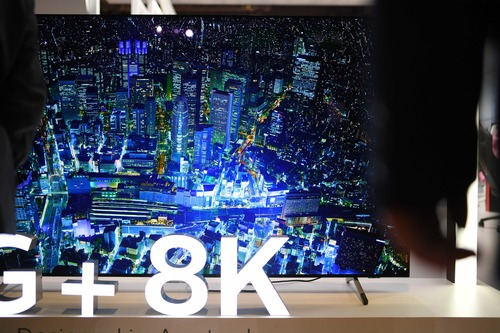SHANGHAI, Nov. 11 (Xinhua) -- With full 5G network coverage in its pavilion, the third China International Import Expo (CIIE) is a dazzling platform for the world's most cutting-edge 5G applications.
During the first CIIE in 2018, 5G had just made its appearance and had few actual applications, but 5G innovation has spread across the CIIE pavilion this year. The expo has witnessed the development of the communications technology in China and around the world.
U.S. chip giant Qualcomm exhibited a 5G mobile test platform at the first CIIE. The 5G mobile phones it unveiled at the second expo had evolved from samples to commercial products. This year, Qualcomm is showing various cutting-edge innovations like 5G millimeter wave, 5G carrier aggregation and 5G industrial internet of things technologies.
A robot ping-pong training system is also on display at the expo, built by the Qualcomm Robotics RB5 Platform which supports 5G networks and artificial intelligence (AI). Visitors are able to play ping-pong with the robot.
On the second day of the third CIIE, Qualcomm China announced it has begun cooperation with the Shanghai University of Sport and Shanghai PongBot Technology Co., Ltd, the manufacturer of the ping-pong robot, to carry out research and development and innovation based on sports training, sports education, entertainment and other scenarios.
"The involvement of technologies such as 5G and AI has promoted the application of robots in many non-industrial fields. For the sports industry, the changes brought about by technology will be subversive," said Yang Luo, chairman of Shanghai PongBot Technology Co., Ltd.
5G's ability to upgrade medical services can also be seen at the third CIIE. Finnish telecommunications conglomerate Nokia showcased its latest 5G solutions for ambulances, where video and data are transmitted to hospitals or emergency centers in real time via 5G networks.
Some companies at the CIIE have even expanded their visions and reached to 6G, which will have a transmission capacity 100 times that of 5G.
Ye Chenhui, technical director of the research department of Nokia Bell Labs (China), said that 6G technology will not only increase capacity but will also integrate communications, sensing and positioning technology.
Ye predicted the future network will have a "sixth sense" and detect subtle environmental changes such as human behaviors and obstacles, which could be applied to many scenarios such as blind spots in autonomous driving and home safety.
Data shows that more than 90 operators around the world have launched 5G networks, and China's 5G development has been remarkable. According to statistics from the Ministry of Industry and Information Technology, a total of 690,000 5G base stations have been set up in China as of the end of September, connecting more than 160 million terminals.
Qualcomm China Chairman Frank Meng said that during the evolutions of past generations of communications technology, few manufacturers produced terminals in the first year of commercial service, while most chose to wait and see.
"However, in the 5G era and especially in the Chinese market, almost all manufacturers are active in embracing the new tech. The speed of commercialization and the rapid iterations of product prices toward the mid-to-low end were not seen in the 3G and 4G eras," said Meng.
Wang Shen, marketing director of the China Mobile Business Group at Nokia Shanghai Bell, said there is no past experience in 5G business construction, which requires continuous exploration, and 5G product and technology maturation needs to follow objective laws.
"Rome was not built in a day. 5G still needs long-term construction and deep exploration in vertical industries. However, when the entire network is laid out, 5G will become an excellent weapon for the digital transformation of the entire industry and the cultivation of new economic growth drivers," Wang said. Enditem




 A single purchase
A single purchase









